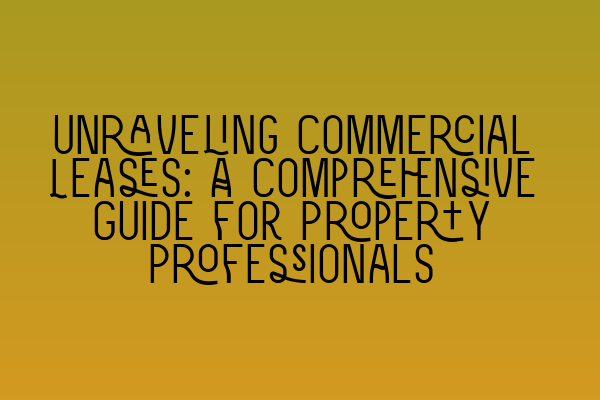Unraveling Commercial Leases: A Comprehensive Guide for Property Professionals
Commercial leases play a vital role in the property industry, allowing businesses to secure premises for their operations. However, understanding the intricacies of commercial leases can be overwhelming, especially for property professionals. In this comprehensive guide, we will break down the key concepts and provisions of commercial leases, equipping you with the knowledge to navigate this complex area of property law.
1. Introduction to Commercial Leases
Commercial leases are binding contracts between a landlord and a tenant, allowing the tenant to occupy and use a property for commercial purposes. These leases are typically long-term and involve the payment of rent, along with various other responsibilities and obligations for both parties.
To fully understand commercial leases, property professionals need to familiarize themselves with the different types of leases, such as full repairing and insuring leases, internal repairing leases, and lease with the option to renew. Each type has its own implications and requirements, which must be carefully considered before entering into a lease agreement.
Whether you are a landlord or a tenant, it is crucial to approach commercial leases with a detailed understanding of the legal framework and the specific provisions that should be included to protect your interests.
2. Key Provisions in Commercial Leases
2.1 Rent and Rent Review
The calculation and payment of rent is a fundamental aspect of any commercial lease. Property professionals must be well-versed in the different methods of rent calculation, such as fixed rent, turnover rent, or stepped rent. Additionally, understanding rent review provisions is crucial to ensure that rent increases are fair and in line with market conditions.
2.2 Repair and Maintenance Obligations
Commercial leases often impose repair and maintenance obligations on the tenant. These obligations can vary depending on the type of lease, ranging from full repairing and insuring leases where the tenant is responsible for all repairs, to internal repairing leases where the landlord retains responsibility for external repairs. Property professionals need to carefully consider these provisions to ensure that the allocation of repair responsibilities is fair and reasonable.
2.3 Assignment and Subletting
The ability to assign or sublet a commercial lease can be crucial for tenants who may need to downsize or relocate their business. Property professionals should understand the restrictions and requirements imposed by the lease on assignments and subletting, as well as the rights and obligations of both landlords and tenants in these situations.
2.4 Termination and Break Clauses
Understanding the termination and break clauses contained within a commercial lease is essential. These clauses outline the circumstances in which the lease can be terminated early, providing flexibility for both landlords and tenants. Property professionals must carefully review these provisions to ensure that they are clear and enforceable.
3. Negotiating Commercial Leases
The negotiation stage of a commercial lease is crucial for both parties involved. Therefore, property professionals must possess excellent negotiation skills to achieve a fair and balanced agreement. This involves understanding the needs and objectives of the landlord and tenant, identifying potential areas of contention, and proposing solutions that meet the best interests of all parties.
During negotiations, it is also important to review the lease in its entirety, ensuring that all terms and conditions are clearly defined and unambiguous. Property professionals should pay particular attention to any special provisions or additional clauses that need to be included to protect their clients’ interests.
4. Professional Advice and Legal Compliance
Given the complexity and legal implications involved in commercial leases, seeking professional advice is highly recommended for both landlords and tenants. Property professionals should work closely with qualified solicitors who specialize in property law to ensure that all necessary legal obligations are met and that the lease accurately represents the interests of their clients.
Furthermore, property professionals need to stay up to date with any changes in legislation or regulations that may impact commercial leases. This includes understanding the legal requirements for energy efficiency, health and safety, and accessibility, as well as any tax or licensing obligations.
Conclusion
Commercial leases are an integral part of the property industry, providing businesses with the premises they need to operate. However, navigating the legal complexities of commercial leases requires a comprehensive understanding of the key provisions and negotiation strategies.
Property professionals play a vital role in ensuring that commercial leases are fair and equitable for both landlords and tenants. By staying informed, seeking professional advice, and approaching negotiations with a well-rounded strategy, property professionals can confidently unravel the intricacies of commercial leases and meet the needs of their clients.
For further preparation and study resources for property law, you may be interested in our related articles:
